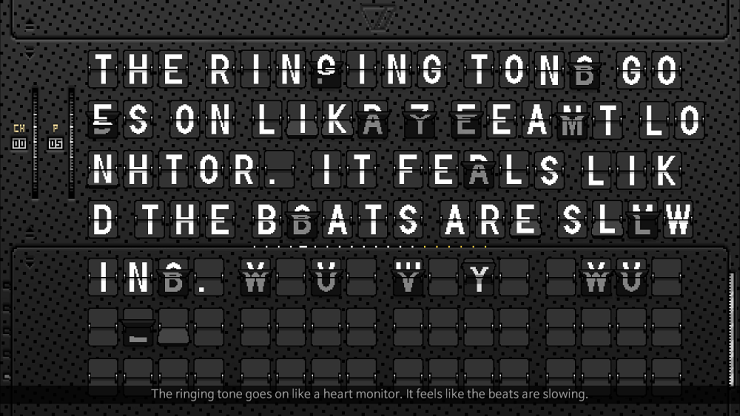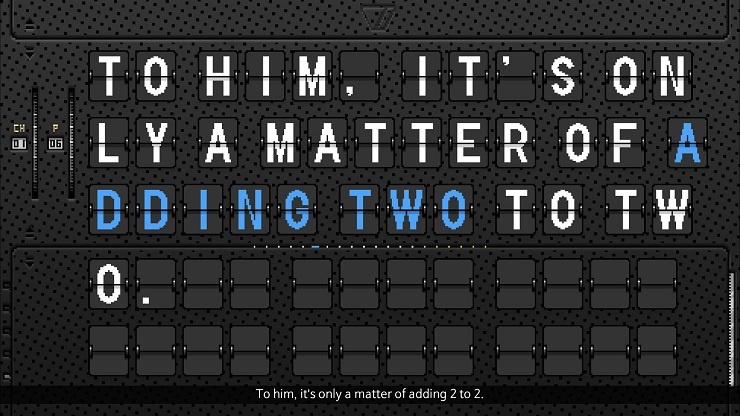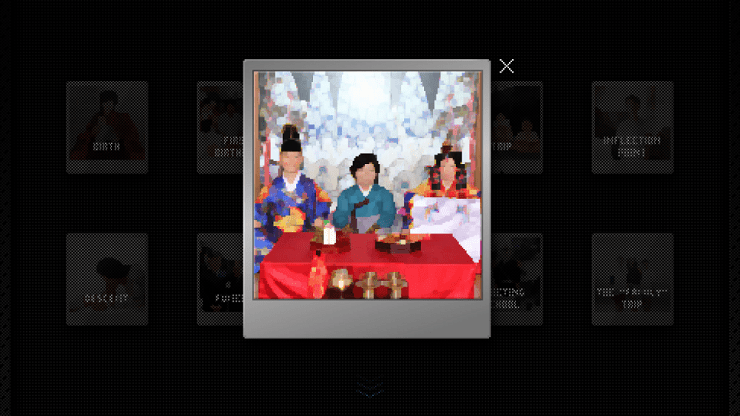The Wake: Mourning Father, Mourning Mother delves into the complex, raw emotions we have and hide while grieving, and our hope for understanding.
A man is in a coma, and his journal has been left behind. You’d think that would be an easy way to get to know someone, but this journal is kept within a unique machine. It’s something between a flip clock and an encryption device, hiding the writer’s messages and writings behind a cipher you need to figure out. While the messages are all unveiled by careful letter substitutions, don’t assume that you’ll figure it out easily. It’s not long before this game gets quite devious with its puzzles.
The answers are all hidden within the text. But hidden may not be the best way to put it? Most of the important letters and messages are highlighted, making it easy to track them down. It’s in figuring out how these messages apply to the cipher, and which messages are the ones you need to work with, that make for some brain-busting moments.

While I was trying to crack these codes, I often found myself distracted by the story and text. The journal chronicles the events surrounding a grandfather’s funeral, with the main character interacting with their father, mother, and other family members throughout the three-day ceremony. We spend time with each of these people through the text, getting to know aspects of them throughout the funeral.
The Wake has us speaking with family members, watching as they work their way through the challenges of carry out a funeral and dealing with their complicated feelings toward the other family members, living and dead. It’s somehow both heartwarming and extremely difficult to read about their hard times, their mundane tasks, and their small moments of happiness as the funeral marches ever forward. While there were cultural differences present in the grieving ceremonies within the game (at least, for me and what I’ve seen of funerals), the emotions are all very similar to what I’ve felt in saying my last goodbyes, mingling the joy of life and the unending internal void of mourning.
Death brings out many strange feelings as we struggle to cope. My family loves to tell jokes and be ridiculous during these times of grieving. It’s like we all feel a need to pick up those who are sad and make them somehow feel better. And since most of my family is like that, even when one of them passes, part of the mourning process for the rest of us means turning their funeral into as much of a comedy as possible. As a family that loves humor, it always seems like the best way to honor the person we’re lost.

But isn’t this humor a kind of avoidance? A means of hiding our grief behind silly jokes and happy words? When I was younger, I accepted this outward-facing shield against grief as my family’s true feelings, but they’re a kind of mask in a way, aren’t they? I’m not judging them for coping in this way, but these actions can make it difficult to know and understand what they were really feeling. We’re all just putting on a brave face for the others, even as emotions are tearing us up from the inside.
The Wake works to capture our behaviors around grief. It’s a clear journal of the events that happened, but when a loved one dies, even if we have very complex, or even hateful feelings about them, it can be difficult to face these feelings head-on. We find ways to look at them from a skewed angle, be it stoic or silly, or if we just keep so busy we hope to outrun our feelings. We may think we’re telling the truth about what we feel, but we can’t even begin to face it. The journal gives us an exact image of the funeral and its events, but these are penned by someone feeling their way through them. What they put in their journal is only one facet of what they truly feel. It’s sterilized to an extent, no matter how evocative the text might be. Words can come close, but they can’t ever truly convey the pain of grief. Especially for someone who can hardly bear to look at it.
The Wake appears to be exploring these masks and the distance we have to keep from our true feelings through the puzzle box. It’s a document written from the heart, but it hides its true meanings, or at least attempts to skew them. But it is still asking for the other person to understand. Which is an odd, yet common thing to need in times of grief. Even if we’re hiding our pain, we want our loved ones to understand how we feel, somehow.
The puzzle is hiding the truth of the main character’s feelings on the one hand, but in the other, they’re crying out for you to see that they’re in too much pain to process what’s happening. It’s two stories happening at once: the mask and the real, and we’re begging the other person to unravel the puzzle and understand what we truly feel. If only so they can address it very carefully, or join you in your avoidance.

We want those around us to understand how we feel, but we can barely face this feeling ourselves. We want the people around us to acknowledge the size of the void our loved one has left behind, or that perhaps our feelings around them are not so joyful. Maybe we feel nothing for the person lost, and maybe that makes us feel a kind of guilt. There is so much going on during a funeral, and most of us are just doing everything we can to hold on. And we need those around us to understand, even if they don’t know the full story.
This journal as puzzle mimics these complicated feelings – this sense of not ever being able to truly know another’s pain at a funeral, even if we loved or hated the person who’s passed as well. We can never know the scope and complexity of what another is feeling no matter how much we may care, but we can try. We can build an empathy with the person through looking at what they feel, as best as we can know, and trying to be compassionate to their needs. It’s all we can do when a friend or family member passes, attempting to lean on one another even if we can never fully know what they’re going through.
The puzzles of The Wake are a means of trying to understand the complexities and difficulties buried in a family history, getting to know a side of someone we may have never seen before. Being with someone in grief is a side we’ll hopefully see few times in our lives, but while we have different ways of processing it, feeling it, and dealing with it, we need to decipher, as best we can, how we can lean on one another. Grief is difficult to endure alone, and sometimes even harder to share, but it’s in facing it together – struggling to understand the unknowable in another, even if we never acknowledge it in words – that we have a chance to begin to heal. It makes for a striking, thoughtful experience that has me thinking about how I will face my family and friends the next time we lose someone dear to us.
The Wake: Mourning Father, Mourning Mother is available now on Steam.

